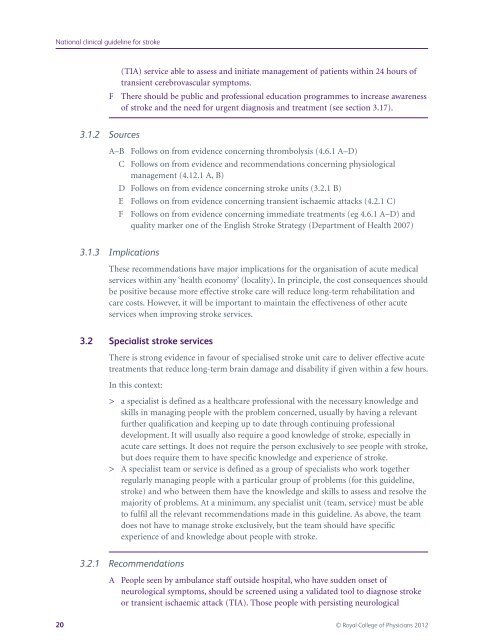national-clinical-guidelines-for-stroke-fourth-edition
national-clinical-guidelines-for-stroke-fourth-edition
national-clinical-guidelines-for-stroke-fourth-edition
You also want an ePaper? Increase the reach of your titles
YUMPU automatically turns print PDFs into web optimized ePapers that Google loves.
National <strong>clinical</strong> guideline <strong>for</strong> <strong>stroke</strong><br />
(TIA) service able to assess and initiate management of patients within 24 hours of<br />
transient cerebrovascular symptoms.<br />
F There should be public and professional education programmes to increase awareness<br />
of <strong>stroke</strong> and the need <strong>for</strong> urgent diagnosis and treatment (see section 3.17).<br />
3.1.2 Sources<br />
A–B Follows on from evidence concerning thrombolysis (4.6.1 A–D)<br />
C Follows on from evidence and recommendations concerning physiological<br />
management (4.12.1 A, B)<br />
D Follows on from evidence concerning <strong>stroke</strong> units (3.2.1 B)<br />
E Follows on from evidence concerning transient ischaemic attacks (4.2.1 C)<br />
F Follows on from evidence concerning immediate treatments (eg 4.6.1 A–D) and<br />
quality marker one of the English Stroke Strategy (Department of Health 2007)<br />
3.1.3 Implications<br />
These recommendations have major implications <strong>for</strong> the organisation of acute medical<br />
services within any ‘health economy’ (locality). In principle, the cost consequences should<br />
be positive because more effective <strong>stroke</strong> care will reduce long-term rehabilitation and<br />
care costs. However, it will be important to maintain the effectiveness of other acute<br />
services when improving <strong>stroke</strong> services.<br />
3.2 Specialist <strong>stroke</strong> services<br />
There is strong evidence in favour of specialised <strong>stroke</strong> unit care to deliver effective acute<br />
treatments that reduce long-term brain damage and disability if given within a few hours.<br />
In this context:<br />
> a specialist is defined as a healthcare professional with the necessary knowledge and<br />
skills in managing people with the problem concerned, usually by having a relevant<br />
further qualification and keeping up to date through continuing professional<br />
development. It will usually also require a good knowledge of <strong>stroke</strong>, especially in<br />
acute care settings. It does not require the person exclusively to see people with <strong>stroke</strong>,<br />
but does require them to have specific knowledge and experience of <strong>stroke</strong>.<br />
> A specialist team or service is defined as a group of specialists who work together<br />
regularly managing people with a particular group of problems (<strong>for</strong> this guideline,<br />
<strong>stroke</strong>) and who between them have the knowledge and skills to assess and resolve the<br />
majority of problems. At a minimum, any specialist unit (team, service) must be able<br />
to fulfil all the relevant recommendations made in this guideline. As above, the team<br />
does not have to manage <strong>stroke</strong> exclusively, but the team should have specific<br />
experience of and knowledge about people with <strong>stroke</strong>.<br />
3.2.1 Recommendations<br />
A People seen by ambulance staff outside hospital, who have sudden onset of<br />
neurological symptoms, should be screened using a validated tool to diagnose <strong>stroke</strong><br />
or transient ischaemic attack (TIA). Those people with persisting neurological<br />
20 © Royal College of Physicians 2012


